In July of 2005, an accomplished voice actor named Susan Bennett was hired to record a bunch of material. For an entire month — 4 hours per day, 5 days per week — she sat in a studio reading sentences that seemed to make no sense. Stuff like, “Say the zzzzzzz ding again.”

When the work was done, Bennett collected her hourly rate and moved on to the next gig. She was not told what the recordings would be used for.
Little did she know that 6 years later, her voice would be in the hands of millions of people all around the world, immortalized as the most recognizable virtual timbre in the history of mobile phones: Siri.
Today, voice assistants like Siri, Cortanta, and Alexa are becoming more ubiquitous — but we rarely get a chance to meet the people behind those voices.
We recently sat down with Bennett to learn a bit more about her life and experiences as the original voice of Siri. The transcript below has been lightly edited for brevity.
ZC: To start off, how’d you get into voice acting?
Growing up, I had no concept that you could actually make a living with your voice.
In the early ‘70s, I graduated from Brown, ended up in Atlanta, and started singing in clubs. Through that, [I] got some interesting opportunities [Bennett’s being humble here: She was a backup singer for some big names, like Burt Bacharach and Roy Orbison].
I started spending a lot of time in studios recording backup vocals and singing jingles.
One day, I had just finished recording a jingle for a product and for whatever reason, the voice actor for the ad didn’t show up to read the copy. The studio owner said, “Susan, you don’t have an accent; come over the read this copy.” I thought, ‘Ding, ding, ding! I can do this!’ The job went well and I decided to get a voice acting coach and an agent.
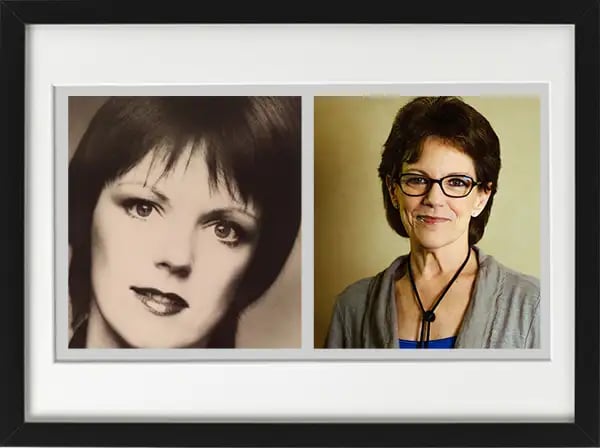
Where would we have heard your voice?
I did jingle and voice-over work for hundreds of companies — Coca-Cola, McDonald’s, Macy’s, Goodyear, Papa John’s, IBM. I am the voice you hear over the loudspeaker at Delta Airlines gates, and also on a bunch of GPS and phone systems.
You were also the ‘voice’ of one of the first-ever ATM machines, right?
That’s right! In the early ‘70s, The First National Bank of Atlanta [now Wells Fargo] started introducing some of the earliest ATM machines — but nobody would use them! People didn’t trust computers yet.
So, they decided to personalize the machine by putting a little face of a smiling girl on it. They called her ‘Tillie the All-Time Teller,’ and they hired me to sing a jingle in her voice. It became the first successful ATM machine in the United States.
In these days, actors would simply record entire pre-written paragraphs or sentences. But flash forward a few decades, and computers began to change everything. When did you start to notice this shift?
In the early 2000s, I was working for a telecommunications company called Lucent Technologies, recording Interactive Voice Response (IVR) systems. [IVRs are those automated telephone menus you hear — “Press 1 for x; Press 2 for Y”].
They handed me a paper and asked me to read this absolute nonsense.
It was the most fascinating process. I had to wear this little belt over my vocal cords — a laryngograph — to measure the wavelengths of my speech for consistency. I had to pronounce things incredibly articulately.
They’d take my recordings and chop them up into syllables and sounds, then a computer could combine them into phrases and sentences. [This process is called concatenation.]
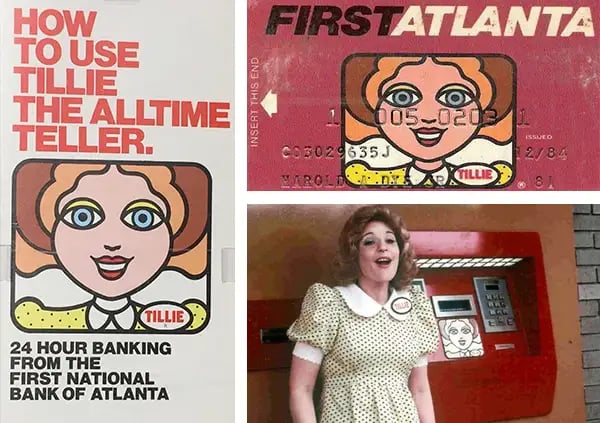
So, how did you land the Siri gig?
In July of 2005, I was hired by ScanSoft [now Nuance Communications], the biggest IVR company in the world, to do some recordings.
It was 4 hours a day, 5 days a week, of reading pages and pages of these nonsensical things—
Sorry to butt in, but can you give us some examples?
“Militia Oy Hallucinate Buckram Okra Ooze”… “Cow hoist in the tub hut today”… “Cathexis fefatelly sexual ease stump”…
Then, there were sentences where you’d change just the vowel each time: “Say the shrodding again,” “Say the shroding again,” “Say the shreeding again,” “Say the shriding again,” “Say the shrading again,” “Say the shrudding again…”
Holy sh*t. Okay, continue…
These sentences had to be read very, very consistently. They had to have the same pitch, same tone, same pacing. It was so tedious and so tough on the vocal cords. I like to say I developed a little brain damage from it…
I actually had no idea what I was there to work on. I thought I was doing general phone voices. But then, 5-6 years later, my voice was Siri, and I was like: ‘Wait, what?’
Wait… so you weren’t hired by Apple? And you had no idea that these recordings would be used for Siri?!
No! When I signed this contract with ScanSoft, they didn’t say what it was for. I basically just gave them permission to use my voice anywhere.
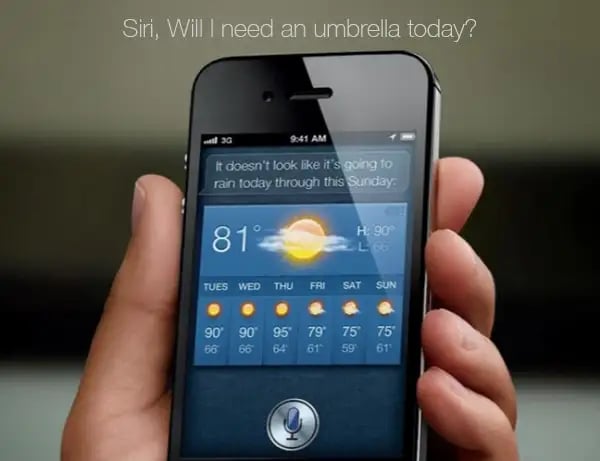
How did you find out your voice had been used?
When the iPhone 4s came out with Siri in October of 2011, a fellow voice actor emailed me and he said, ‘Hey! We’re playing around with new iPhone, and this sounds like you!”
I took a listen and I just said, ‘Oh my God. Yep, that’s me.’
Were you angry? Confused? I mean, Apple never paid you for this.
I had ambivalent feelings about it.
On the one hand, I thought, ‘Wow! I’m the new voice of Apple!’ Then I thought, ‘Yeahhhh… but I never worked for Apple. They never contacted me, and I never got paid.’ I was kind of appalled when it first came out — especially since I didn’t get any kind of compensation for being on millions, and millions, and millions of devices.
It was a combination of being misled and being naive. I just never imagined that technology could take my voice and make it say anything.
It ended up being a huge life lesson. But ultimately, it opened up doors I never would have imagined and started me on a whole new career. So I really have no problem with Siri. [Laughs] I’m very grateful to her!
So, you “discovered” you were Siri in 2011 — but it took you a few years to publicly come out. Apple never revealed who it was. Why so secretive?
It took me 2 years to come out. I wanted to be cautious.
I’m mostly an introvert and I didn’t want to get into the ‘fame’ thing. I was also very concerned that I’d be horrifically typecast and it would affect my VO career. Then, of course, there was the whole question of what I could do legally: I didn’t want to anger thousands of Apple lawyers. I had a lot of things to weigh.
In retrospect, I wish I had ‘come out’ earlier.
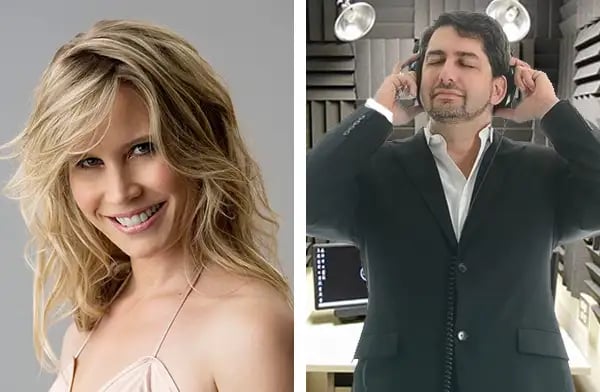
There were other Siri actors too (different accents, different countries). Did they have a similar experience?
None of us knew our voices would be used.
Was Apple angry when you all started coming out as the voices of Siri?
One of the actors (who I won’t reveal) was promoting himself as the ‘voice of Siri’ and got a call from someone at Apple. They said, ‘We’d really appreciate it if you could remain anonymous. Don’t tell people who you are. We want people to imagine whoever they want to imagine on the other end of the phone.’
The thing is, none of us early Siris had non-disclosure agreements. We were allowed to do that, and that’s why all of us are blabbing away! But the voice was changed starting with OS11 — and today’s actors are paid to not reveal who they are.
What was it like to suddenly have your voice on millions of devices around the world? Did you, or the other original actors, struggle with this?
One of the [Siri actors] went through a terrible depression because of it.
Your voice is such a personal thing. It’s like a fingerprint. It’s your intellectual property. And suddenly, it’s no longer yours. And I’m not blaming anyone — we signed a contract to do the work — but I don’t think we had any clue of the ramifications.
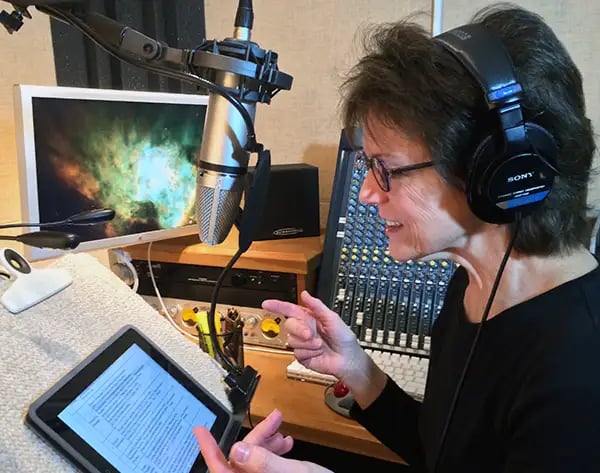
Have you ever talked to the other Siri actors about taking action?
I think one of them wanted to get us all together and sue Apple, but I said ‘No.’ I don’t want to lose all my life savings.
It’s been widely confirmed that you were the voice of the first Siri. Yet, Apple has neither substantiated nor denied this. Why?
If you ask Siri who Susan Bennett is, she’ll say: ‘She’s was the original voice of Siri up until 2011.’ That’s the only acknowledgment I’ve ever gotten from the company.
Though I did meet Steve Wozniak once, and he acknowledged it. That was really fun.
A lot of people say the original Siri had a bit of an attitude. Were you ticked off in the studio or something?
I have an acerbic sense of humor and I think it came through with the voice a little. At the end of those 4-hour recording sessions, I was also a bit tired.
Starting with the iPhone 5s, Apple changed the voice. I thought they’d gotten another actor — but they’d just technologically manipulated my voice to sound a little different. She had a little more smile to her voice and wasn’t as snarky.
Today’s Siri is totally different. She’s a millennial. She sounds very much like Google Assistant, and Alexa. They are sort of indistinguishable at this point.
Do people recognize your voice in public? Like, at the grocery store?
Most people don’t recognize my voice. I sort of speak up a bit higher than I did in the studio. But when I lower my voice a little, people go, ‘Oh — there she is!’
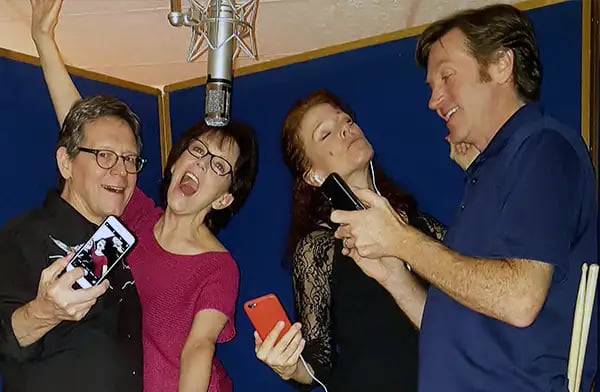
Did you ever use Siri yourself?
I did have Siri on my iPhone but did not speak to myself. I talk to myself enough as it is.
Siri was the first AI assistant on a cell phone and the first to attain mass-market appeal. In some respects, you were the voice of a technological revolution. Do you consider yourself to be a “techie?”
I’m not attracted to technology — and tech doesn’t like me. In fact, I’m so non-techie, it’s ridiculous. Asking me for a tech tip is like asking a vegan for a BBQ beef recipe.
What are you up to today?
I still do voice-over work — but the vast majority of my gigs are Siri appearances, presentations, and events.
I’m also involved in a podcast called Jones.Show, and play in a band called “Boomers Gone Wild!” We just play once a month in a little club north of Atlanta, and we do nothing but 60’s and 70’s rock and soul music. It’s really, really fun!
If anyone’s interested in hiring Siri or wants to learn more about what it takes to get into the voice over space, they can reach me through my website.
Last question: Siri, What is the meaning of life?
Humor.
